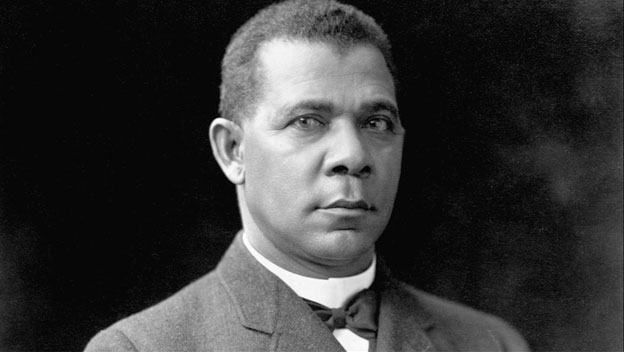Booker T. Washington
Booker Taliaferro Washington 1865 - 1915
Booker Taliaferro Washington was born in Hale’s Ford, Virginia and to the last generation of slaves. He is well known for being an educator, orator, businessman, advisor to presidents, and a leading voice in the black community promoting economic self-reliance among African Americans.
At nine years old, Washington would become a free man because of the Emancipation in 1865. After the emancipation his mother moved the family to West Virginia to reunite with his stepfather who had escaped slavery during the war. Washington was illiterate so he began to teach himself how to read and would later attend Hampton Institute, today known as Hampton University, to aide in his educational accomplishments. However, due to post-Reconstruction – the end of slavery in the late 19th century there were Jim Crow laws implemented which suppressed the rights of African Americans to fully participate in society as free men.
Despite the odds, in 1881, the Hampton Institute president recommended Washington to be the principal of the Tuskegee Institute. He pushed for an industrial education among African Americans by promoting and encouraging students to succeed in farming or other trades that were common for the South.
However, Washington unlike his acclaimed opponent W.E.B. Dubois, was not arguing against segregation. In 1985, Washington gave a speech at the Cotton States and International Exposition in Atlanta, Georgia. His public rhetoric would make him widely known and receive push back from some in the African American community who sought to overcome segregation. Addressing a predominately white audience he spoke the words of his famous speech, The Atlanta Compromise, sharing that African Americans did not need to fight the system but could prosper in the labor of their differences. One line of his speech promoting this belief, “Our greatest danger is that in the great leap from slavery to freedom we may overlook the fact that the masses of us are to live by the productions of our hands….”
Although today many leaders in the African American community fought for civil liberties to be granted to blacks the way to achieve it has been different among the leaders. Booker T. Washington’s views on economic self-reliance and to build and strengthen the black economy continue to be a gap that needs to be narrowed.
























